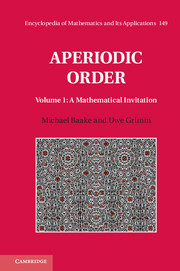Book contents
- Frontmatter
- Contents
- Foreword
- Preface
- Chapter 1 Introduction
- Chapter 2 Preliminaries
- Chapter 3 Lattices and Crystals
- Chapter 4 Symbolic Substitutions and Inflations
- Chapter 5 Patterns and Tilings
- Chapter 6 Inflation Tilings
- Chapter 7 Projection Method and Model Sets
- Chapter 8 Fourier Analysis and Measures
- Chapter 9 Diffraction
- Chapter 10 Beyond Model Sets
- Chapter 11 Random Structures
- Appendix A The Icosahedral Group
- Appendix B The Dynamical Spectrum
- References
- List of Examples
- List of Remarks
- Index
Chapter 1 - Introduction
Published online by Cambridge University Press: 18 December 2014
- Frontmatter
- Contents
- Foreword
- Preface
- Chapter 1 Introduction
- Chapter 2 Preliminaries
- Chapter 3 Lattices and Crystals
- Chapter 4 Symbolic Substitutions and Inflations
- Chapter 5 Patterns and Tilings
- Chapter 6 Inflation Tilings
- Chapter 7 Projection Method and Model Sets
- Chapter 8 Fourier Analysis and Measures
- Chapter 9 Diffraction
- Chapter 10 Beyond Model Sets
- Chapter 11 Random Structures
- Appendix A The Icosahedral Group
- Appendix B The Dynamical Spectrum
- References
- List of Examples
- List of Remarks
- Index
Summary
In April 1982, while on sabbatical at the National Bureau of Standards in Washington, DC, Dan Shechtman from the Technion at Haifa made a profound discovery, for which he was awarded the Wolf Prize in Physics in 1999 and the Nobel Prize in Chemistry in 2011. When inspecting various samples of a rapidly solidified Al Mn alloy with an electron microscope in diffraction mode, he noticed a phase that showed clear and sharp Bragg reflexes together with a rather perfect icosahedral symmetry, similar to the one shown in Figure 1.1. While a Bragg spectrum is a typical fingerprint of a crystal, fivefold or icosahedral symmetry is incompatible with the latter. He concluded that this phase must possess long-range order (to explain the Bragg reflexes) without being a perfect crystal (to be able to accommodate the unusual symmetry). It took Shechtman two years to convince colleagues until the result was finally published in [SBGC84]. Even after the paper appeared in print, prominent scientists (including Nobel Laureate Linus Pauling) expressed their scepticism, though they found themselves in a rapidly shrinking minority as other phases with similar properties were discovered.
In fact, Ishimasa, Nissen and Fukano [INF85] at the ETH Zürich found twelvefold (or dodecagonal) symmetry in a sample of a Ni Cr alloy before they became aware of Shechtman's discovery, while Bendersky [Ben85] demonstrated the existence of another Al Mn phase with tenfold (or decagonal) symmetry soon after (at this stage, we do not distinguish between fivefold and tenfold symmetry).
- Type
- Chapter
- Information
- Aperiodic Order , pp. 1 - 10Publisher: Cambridge University PressPrint publication year: 2013

